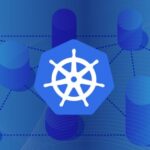Control plane components are the core components of a Kubernetes cluster that are responsible for maintaining the desired state of the cluster. These components include the API server, scheduler, controller manager and etcd. The control plane is responsible for managing the nodes in cluster, deploying applications and services, and ensuring the availability of these applications and services.
The API server manages the lifecycle of objects in the cluster and provides the interface for users to interact with the cluster. It also serves as the front-end for the cluster. The scheduler is responsible for making scheduling decisions based on the resource requirements of the containers in the cluster. It monitors the available nodes and assigns application containers to appropriate nodes for optimal resource utilization. The controller manager is responsible for ensuring that the desired state of the cluster is maintained. This includes replicating pods, maintaining node resources, adjusting network policies, and other housekeeping tasks.
Lastly, etcd is the distributed storage used to store the entire state of the cluster. It is responsible for providing a consistent view of all cluster data, including API objects, cluster configurations, and user data. All changes to the cluster are stored in etcd and acted upon by the control plane components. By relying on the control plane components, Kubernetes can provide high availability and scalability for applications running in the cluster.



Pingback: What is Scheduler in kubernetes? - MtroView